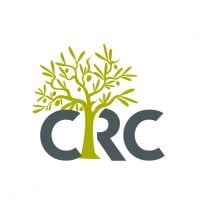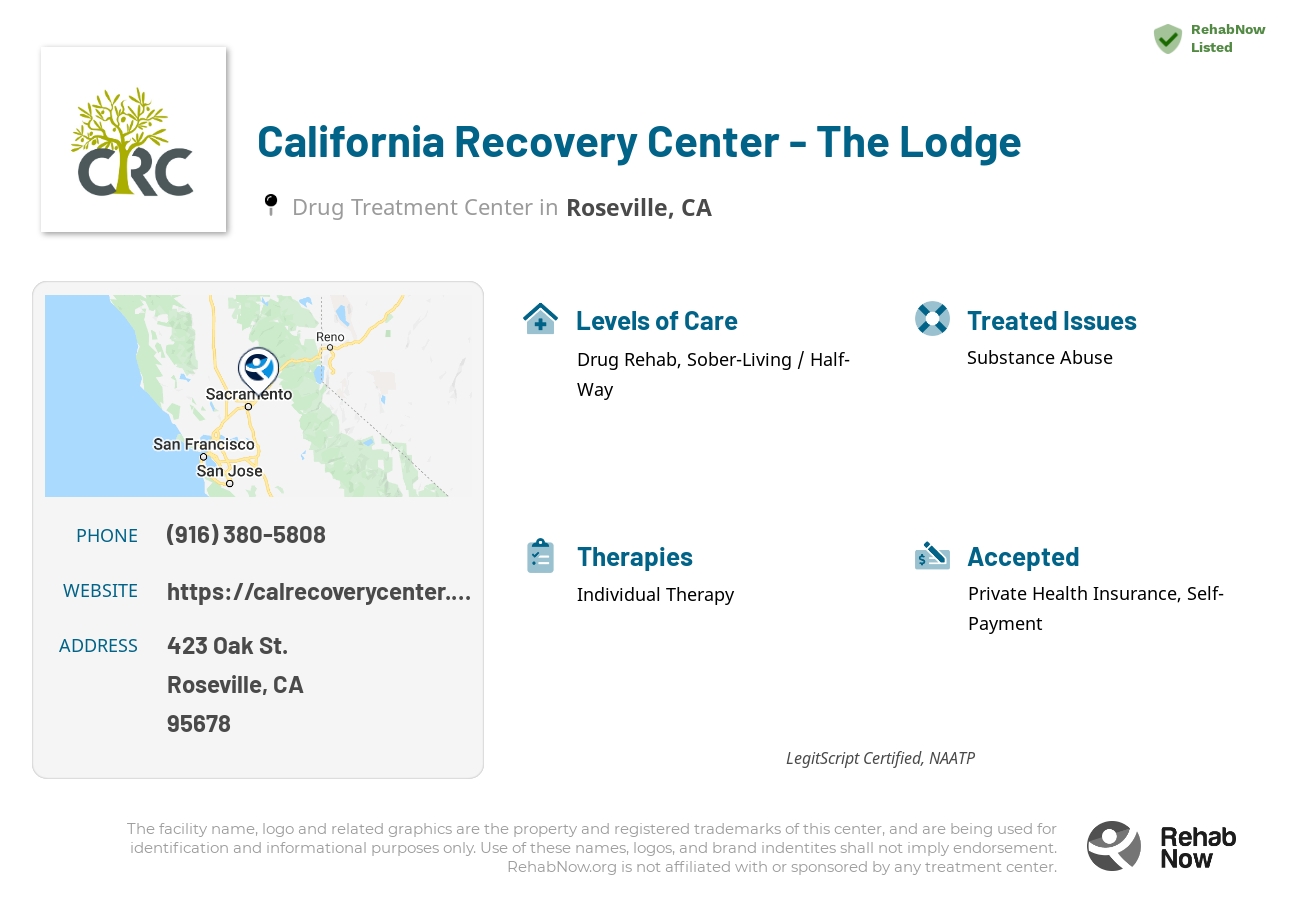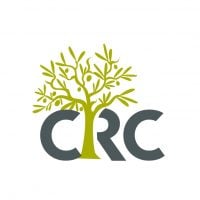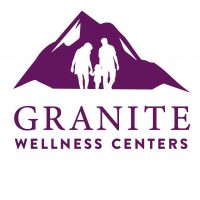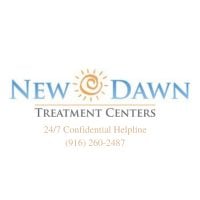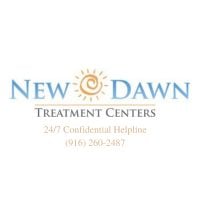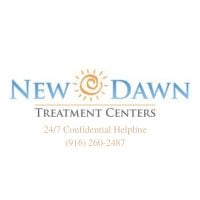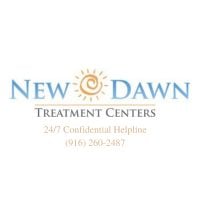California Recovery Center - The Lodge
Drug Rehab Center in Roseville, California
The Lodge is an accredited and LegitScript-certified addiction treatment facility in Roseville, California that provides comprehensive care for its residents through services such as drug rehab, sober living/halfway housing, aftercare support, detoxification and multiple levels of residential care, all while accepting private health insurance to make the process more affordable.
About This California Facility
California Recovery Center – The Lodge situated in Roseville, California, offers a beacon of hope for young adults and adults grappling with drug and alcohol addiction. This public rehab shines through its unique blend of traditional and modern therapeutic approaches, specialized in alcohol detox, and comprehensive care programs ranging from detox to aftercare.
- Specializes in alcohol detox: Catering to patients with a need for a careful, medically-supervised withdrawal process.
- Flexibility through outpatient treatment: Designed for clients to maintain their work commitments while receiving treatment.
- Comprehensive aftercare support: Ensures extended assistance with 12 Step meetings, sober housing options, and a network of sponsors.
Accredited by the National Association of Addiction Treatment Providers (NAATP) and LegitScript certified, California Recovery Center – The Lodge emphasizes quality and evidence-based care supported by a multitude of private health insurance plans. Their welcoming, home-like environment aides in fostering recovery and resilience amongst its clients.
Here, individuals battling addictions from substances to dual diagnosis conditions are offered tailor-made treatment strategies. These include detox, residential care, outpatient programs, and aftercare, incorporating individual and group therapy, psycho-educational sessions, and personalized recovery planning to facilitate long-term sobriety.
Genders
Ages
Modality
Additional
Accreditations
NAATP

LegitScript
Conditions and Issues Treated
People who abuse drugs are likely to suffer from an addiction, which can cause serious health problems. When it comes to helping drug abusers get sober, there are many options to choose from. It is essential to state that there is no “”correct”” way of doing things. People are different, and they need different types of help to get over their addiction.
Levels of Care Offered at California Recovery Center - The Lodge
This center offers a variety of custom treatment tailored to individual recovery. Currently available are Aftercare Support, Detox, Drug Rehab, Residential, Sober-Living / Half-Way, with additional therapies available as listed below.
An addict may have to go through alcohol or drug withdrawal. While detox may be uncomfortable, it is not life-threatening. Detoxification allows the addict to rid the body of all traces of drugs or alcohol and gives the addict a clean slate for their recovery. In an inpatient or outpatient setting, detox can be managed medically.
Sober Living Home (SLH) is a term used to describe houses where people recovering from addiction can stay. The goal of these places is to provide immediate support and protection that the addict needs and force them to live a life free from substance abuse.
SLH’s typically allow the addict to live there for 30, 60, or 90 days. This is intended to enable the addict time to develop a foundation of “sobriety,”; allowing them to adjust to living without the substance while building new life skills. During this time, addicts also typically attend regular addiction, education classes.
Residential treatment programs are those that offer housing and meals in addition to substance abuse treatment. Rehab facilities that offer residential treatment allow patients to focus solely on recovery, in an environment totally separate from their lives. Some rehab centers specialize in short-term residential treatment (a few days to a week or two), while others solely provide treatment on a long-term basis (several weeks to months). Some offer both, and tailor treatment to the patient’s individual requirements.
People who have completed a rehab program often need continued support from the addiction treatment team in order to remain abstinent from drugs and alcohol. Aftercare can be beneficial for personal, social, and emotional growth.
Common aftercare options include:
- Individual Therapy – this type of addiction counseling is available on a one-on-one basis. This can be beneficial for people with a high degree of emotional turmoil and a strong desire to overcome addiction.
- Group Therapy – this type of addiction counseling is available in a group setting. This type of treatment can be beneficial for people who are unable to attend regular therapy appointments due to other responsibilities.
- Family Therapy – this type of addiction counseling is available to the family members of addicts. This can be beneficial for people who are unable to fully comprehend what their loved ones are experiencing due to addiction.
Therapies & Programs
Therapy sessions focused on the individual addict can provide much-needed guidance as they work toward overcoming their addiction. These types of sessions typically involve guidance from a therapist, who will help addicts identify and process their feelings and cravings.
During these sessions, addicts may develop plans for coping with the triggers that typically lead to relapse and learn how to avoid those triggers during their recovery process.
The main goal of family therapy for drug addiction is to create an environment where communication can occur without judgment, hostility, or blame that often occurs within a family.
Family therapy is a type of group problem-solving that aims to improve communication and relationships between the patient, their family, and sometimes friends. The therapist is with the family as they learn to communicate with each other differently, especially with the addict when s/he is using.
The family can learn to reduce their enabling behavior or rally together and support each other during tough times. The patient also learns how to deal with their addiction and maintain sobriety while interacting with the family.
Different types of addiction treatment services are available. Within this article, group therapy is of interest due to its high success rate compared to individual therapy. Group therapy settings are beneficial because they allow recovering addicts to build a strong support network.
Benefits of group therapy are:
- Reduces feelings of isolation
- Immediate access to social support in the form of fellow addicts in recovery
- Lowers risk of relapse
- Increases rate of sobriety
- Builds coping skills that can be applied to everyday life
Trauma Therapy is a form of therapy that involves working with a patient to help them process and understand the past trauma(s) in their life. The idea behind it is that while some people can experience traumatic events and not have lasting psychiatric symptoms, many others will. In these cases, memories of the event get hidden from consciousness but continue to influence how the person processes and copes with things in their life. They may avoid situations that resemble what happened or become suddenly angry or irritated to a situation that reminds them of a past event.
With the help of a therapist, people can go back over memories and experiences. This helps them understand why they are having problems coping with certain situations and how they can change how they think and react to things. This therapy is typically done using techniques such as visualization, discussion, and writing down thoughts and feelings.
Trauma therapists will work with clients to help them understand their past and present relationships. Many times, patients may believe that something is inherently wrong with them or that they are unworthy of love. A therapist aims to correct these negative feelings and behaviors by helping the person realize that their actions do not reflect who they truly are.
One of the main goals of trauma therapy is to help clients express their emotions and talk about what they are feeling. This benefits both to increase awareness of how certain events have impacted them in the past and enables patients to realize that they can make changes in their lives.
Payment Options Accepted
For specific insurance or payment methods please contact us.
Is your insurance accepted?
Ask an expert, call (888) 674-0062
California Recovery Center Associated Centers
Discover treatment facilities under the same provider.
- California Recovery Center in Roseville, CA
- California Recovery Center - The Zen House in Roseville, CA
Learn More About California Recovery Center Centers
Additional Details
Specifics, location, and helpful extra information.
Roseville, California 95678 Phone Number(916) 380-5808 Meta DetailsUpdated April 15, 2024
Staff Verified
Is California Recovery Center – The Lodge a LegitScript Verified Treatment Facility?
According to our most recent records, we have found this center to be LegitScript verified.
Patient Reviews
There are no reviews yet. Be the first one to write one.
Roseville, California Addiction Information
More than 3 million of California's citizens are addicted to illegal drugs. Almost 800,000 people use hard drugs, almost 5 million use marijuana, and another 2.1 million abuse alcohol every year. Other substance abuse issues such as binge drinking and teen drug use are also common. Many illegal drugs such as cocaine, heroin, methamphetamine, and marijuana are smuggled into the state from Mexico.
The drug addiction problem in Roseville, CA is quite bad. According to recent statistics, the county of Placer has ranked high for drug overdose deaths. In 2014 alone, 38 people died from a drug overdose. This is a very alarming problem that has been affecting the community. Drugs like heroin, methadone, and hydrocodone are common, but there is a growing problem with the abuse of prescription painkillers.
Treatment in Nearby Cities
- Lompoc, CA (287.8 mi.)
- Lake Forest, CA (405.8 mi.)
- Rancho Cucamonga, CA (381.0 mi.)
- Morgan Hill, CA (113.6 mi.)
- Scotts Valley, CA (123.8 mi.)
Centers near California Recovery Center - The Lodge
The facility name, logo and brand are the property and registered trademarks of California Recovery Center - The Lodge, and are being used for identification and informational purposes only. Use of these names, logos and brands shall not imply endorsement. RehabNow.org is not affiliated with or sponsored by California Recovery Center - The Lodge.
